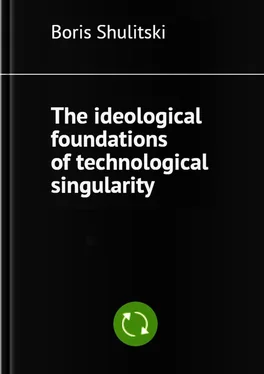The ideological foundations of technological singularity
Boris Shulitski
© Boris Shulitski, 2019
ISBN 978-5-4496-3328-6
Created with Ridero smart publishing system
Two centuries ago, Friedrich Engels emphasized: dialectical materialism must change its form in the course of each new major discovery in natural science. It was evident for him, that scientific philosophy is not a dogma, but if it claims to be a worldview, it must develop and substantially enrich itself both in respect of its form and in content together and in parallel with the scientific progress in science. As the history of the development of the Soviet philosophical school showed, that this was not always the case.
In the former Soviet Union space, philosophy today is experiencing a serious crisis, primarily because of its ignoring of the new reality that has now been formed, which is briefly described by the term “informational society”. Concentrating on the historically established, traditional model of the world cognition – through the binary opposition “matter-consciousness” – still not enough attention is paid to “information” as the third element, forming scientific ideas about objective reality and very significant for a scientific worldview the construction.
Meanwhile, here are found such intensively developed ways of creating information technologies that require reflection, primarily at the worldview, philosophical level, in order to create an adequate methodological basis for scientific research in this area, to provide an adequate understanding of human practice and creativity. It is important for us to understand, comprehend, explore this new perspective from the standpoint of its informational phenomena and give informational concept on the background of the small number of works in this area, thereby partially compensating for the lack of knowledge and ideas that has arisen here, covering the absolute blank that is also called tabula rasa. It is exactly this way, that the research program by B.G. Shulitsky is being developed, moreover, very effectively.
It is important to mention, that the author, unlike other modern research groups and teams looking for new ways, means and methods of cognition through the exploitation of metaphysical ideas, correctly focuses on the need of comprehensive using of dialectical methodology as the leading epistemological line of conceptual development in the scientific search of the third millennium. The book attempts to apply the dialectical methodology in its generalized interpretation, with the involvement of its informational element, which greatly expands its capabilities, providing its effective application in a number of interdisciplinary areas. In particular, it concerns the integrated worldview of applied internetics, where it acquires a new appearance and new functions, further, exploratory research of information-stimulated processes in nanotechnology, as well as in other areas. The author raised a number of fundamental questions. The answers to them have beenyet received by neither science nor philosophy, but these questions are of undoubted interest for interdisciplinary complex analysis and synthesis.
.
Doctor of Philosophy, Leading Researcher of the Institute of Philosophy of the National Academy of Sciences of Belarus
E. M. Soroko
…To look at the world in a new way, you need to change the interface and reboot the matrix of perception. The world will reboot…
From the movie “Matrix. Reboot”
Speaking about the practical activities of man, G. W. Hegel prophetically pointed out the special role of its material elements – the instruments of labour . People “ seek to satisfy their interests, but because of this, something bigger is accomplished, something that is hidden in them, but that they were not conscious about and that was not part of their intentions… ”. “ People work, set limited goals, achieve them, but at the same time something different is achieved than these goals people actually set …”. This is something that Hegel associates with the active nature of the Absolute Idea, which dwells beyond human passions, interests and goals, acts as if behind people’s backs, but at the same time is hidden inside them, solving the infinite task associated with the function of its self-knowledge. It is here that the brilliant prophetic insight of Hegel can be found: “ The instruments of labour, ” as stated in “Logic,” stand above those final goals of man, the realization of which they serve …”.
At present we see practical confirmation of Hegel’s brilliant insight. The analysis of the processes, phenomena and trends of the modern technocratic world shows that what is happening really contains elements that may be something different than the declared goals of people; these are elements that are above the interests and goals of people, as if staying behind their backs, concealed, but at the same time present in people’s goals. In this regard, exploratory research is in the field of adequate understanding and awareness of the true role and real place of a person in the world, its objective evolutionary goals and tasks, as well as optimization of ways to achieve them, taking into account its personal interests, is of utter importance. This should be possible as part of a new general scientific global picture, the formation of which has long been in demand by the scientific and technological revolution of the last few centuries.
One of the options of search for a new general scientific picture of the world is a hypothetical picture of the world, which is based on certain axioms and hypotheses. The criterion of the appropriateness of this kind of conceptual constructions is the correspondence of the conceptual conclusions of this kind to the real processes of the surrounding world, as well as its heuristic and prognostic capabilities, in particular, in the field of searching for fundamentally new, innovative technologies to be practically implemented. This criterion allows the method of successive iterations, through a series of hypothetical worldviews, to reach, step by step, the real worldview.
This book suggests a constructive research program focused on the formation of one of such possible hypothetical pictures of the world and an assessment of its correspondence to the surrounding world. An axiomatic approach is used as the basic element, that is, an experimental matching of a key (code, cipher) to the structure of actual reality in the form of an initial set of basic axioms. This is a well-known principle of stepwise scientific knowledge of the new, consisting of six stages, six steps of scientific search: “axiom → hypothesis → concept → experiment → theory → practice”. The indisputable and final criterion to verify the hypothetical conceptual constructions is the correspondence of the conceptual conclusions to the real processes of the surrounding world, as well as its heuristic and predictive capabilities that open the way to applied innovative technologies.
At the first stage , a set of basic axioms is suggested, which has shown its practical effectiveness (efficiency) as a key, a code to the structure and global processes of actual reality. The starting point for the new general scientific worldview, or let us designate it as the “ energoinformational world view ”, are two basic axioms:
– Dialectics is the universal inherent basic property of actual reality ( the axiom of the universality of dialectics ).
– Structurality is a universal inseparable basic property of actual reality ( an axiom of structurality ).
Читать дальше










